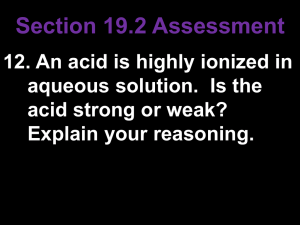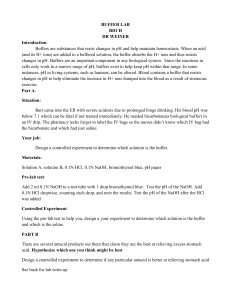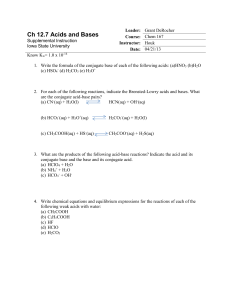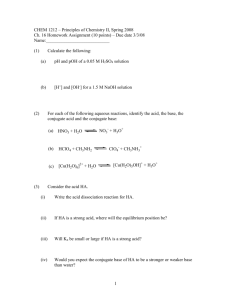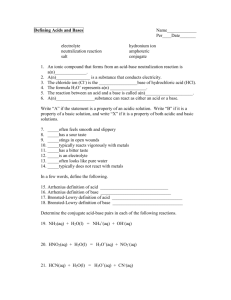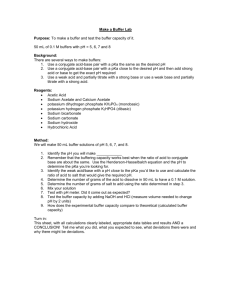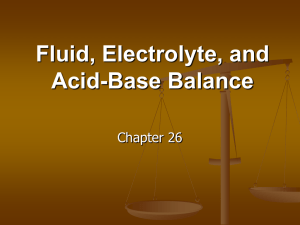Acid-Base_Reactions--Honors_
advertisement
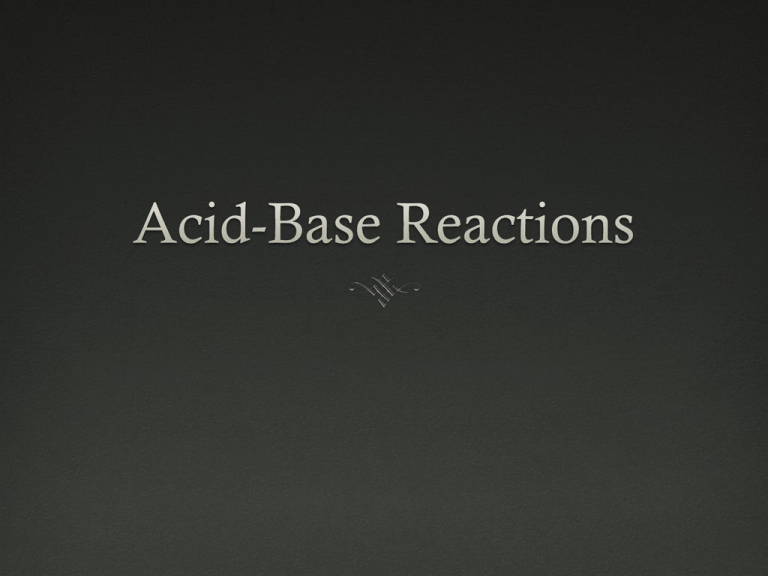
Neutralization Reactions Type of acid-base reaction Strong Acid + Strong Base----all OH- ions combine with H+ ions to give water molecules Produce water and a SALT, MX. A salt is an ionic compound. HX + MOH MX + H2O ACID + BASE SALT + WATER Example 1: NaOH(aq) + HCl(aq) NaCl(aq) + H2O(l) What are the spectator ions? What is the net ionic equation? Example 1: continued NaOH(aq) + HCl(aq) NaCl(aq) + H2O(l) Na+(aq)+ OH-(aq) + H+(aq)+ Cl-(aq) Na+(aq)+ Cl-(aq)+ H2O(l) What are the spectator ions? Na+ and Cl What is the net ionic equation? OH-(aq) + H+(aq) H2O(liq)----always with strong acids and bases Salts Ionic compounds Formed using cation from base and anion of acid Can have acidic or basic properties if one acid/base component is strong and the other is weak. Examples: NaCl, Na2SO4, MgCl2 Example 2: Predict the products from the acid-base reaction between H2CO3 + Sr(OH)2 Write the complete, balanced equation as well as the net-ionic equation. Practice! Complete and balance the following acid-base reactions. Write the net-ionic equation as well: 1) HClO4 + NaOH 2) HBr + Ba(OH)2 3) HNO3 + KOH 4) Ca(OH)2 + HNO3 5) Mg(OH)2 + HCl What are acid-base indicators? Contains a weak acid and its conjugate base Weak acid—one color Conjugate base—different color Changes color based on what solution (acidic or basic) it is placed in. Change color over a specific pH range –transition interval Used when specific pH measurements not needed, seen a lot with titrations Common Indicators Phenolphthalein Litmus indicator Broad pH range Litmus— Dye originating from lichens pH < 4.5 (red), pH > 8.3 (blue) Buffers A mixture composed of a weak acid and its conjugate base OR weak base and its conjugate acid buffers” or reduces the affect of a change in the pH of a solution Absorbs slight changes in pH resulting from the addition of small acid/base amounts to water. Buffer capacity— indicates how much strong acid/base can be tolerated in a buffer solution before pH changes Trait of buffer Types of buffers 1) Acidic Buffers Formed from mixing a weak acid and its conjugate base pH < 7 2) Basic Buffers Formed from mixing a weak base and its conjugate acid pH > 7 Why are buffers important to us? Buffers present in our body keep fluids within a certain pH range. Blood has a pH range of approximately 7.3-7.4. A buffer involving H2CO3/HCO3- maintains the blood pH Homework: Additional pH calculations worksheet
